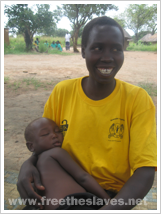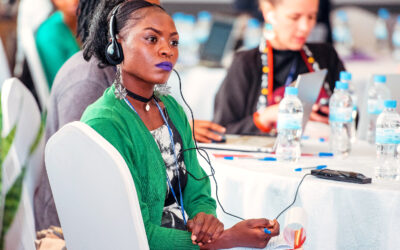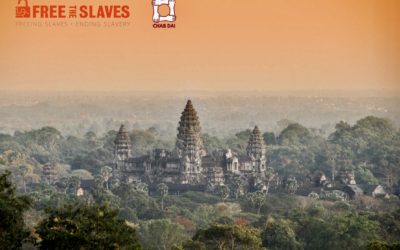This is the first of three case studies, written back in July, on the work of Friends of Orphans (FRO), our partner organization in Uganda. FRO founder Anywar Ricky Richard was the recipient of the annual Harriet Tubman Freedom Award.
Abducted in 1998 as a young girl, Akello Betty (pictured to the right) spent six years in the bush as a wife of an LRA soldier. Her forced marriage produced two children before Ugandans soldiers captured her husband. Now 23, Akello is the mother of three children and the sole provider for her family; her husband, that same LRA soldier, whom she willfully married some years later, is disabled and unable to work. Life had not been easy. Akello cultivated her neighbors’ gardens by hand and was earning enough to send her oldest child to school, but she worried for the future. She sensed her community’s rejection of her because of her past, and felt she had little control over the outcome of her life and that of her children.
 Earlier this year, through the Free the Slaves-Friends of Orphans agricultural program, Akello’s outlook began to change. She received seeds, goats, and an ox and ox plough, which she shares with another community member. She worked with the whole community to cultivate the land and their crops are doing well, much greener and healthier and more abundant than the crops of their neighbors. The process of shared farming has encouraged more dialogue among community members, including open discussion about difficult past experiences. The rejection that Akello once felt is dissipating.
Earlier this year, through the Free the Slaves-Friends of Orphans agricultural program, Akello’s outlook began to change. She received seeds, goats, and an ox and ox plough, which she shares with another community member. She worked with the whole community to cultivate the land and their crops are doing well, much greener and healthier and more abundant than the crops of their neighbors. The process of shared farming has encouraged more dialogue among community members, including open discussion about difficult past experiences. The rejection that Akello once felt is dissipating.
Read More >>
Eager to spread the benefits of their own training, the community has been sharing their new knowledge with their neighbors so that they can improve their next year’s harvest. In addition, Akello has also used her ox plough to cultivate others’ land for a small fee. The plough allows her to work more quickly over a larger area, earning more income for her family than when she dug with her hands.
Akello feels her life changing. If the rains continue, this year’s harvest will be good, and she is guaranteed to have seeds for next year’s planting. She is developing courage and feels more in control of her life. She points to the last picture on a poster that was created to explain the purpose of the project to participating communities. In it, every person is smiling. They have enough to eat and in the background is a bright green garden. She has hope that her life will soon resemble the picture, and that she can call her self “sustainable.”
This film is available for purchase here.



